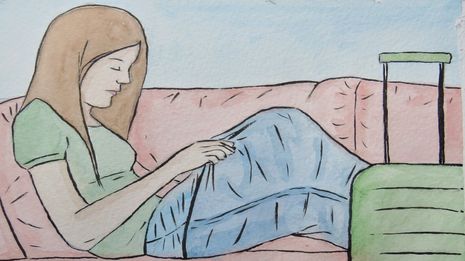Lockdown: the experience of an estranged student
“What happens if I can’t go home?’ An anonymous student discusses the precarious situation of having no home to return to during the pandemic.

As whisperings of the dreaded “lockdown” turned into a harsh reality, I quickly saw my sofa-surfing, bartending summer plans scattered by the wave of uncertainty that struck the UK at the beginning of the pandemic. Amidst a flurry of hasty plans and packing bags, colleges closed their libraries, sent students home, and prepared for an “unprecedented” online exam term. We all have different stories of fear and anxiety during this time, of asking questions no one had answers to. But as it became increasingly clear that this was not going to be over anytime soon, the question I was left asking was: what happens if I can’t go home?
Estranged students are young people studying without the support from their parents (or family) due to a breakdown in the relationship, meaning they have needed to remove themselves from an unstable home environment without the intervention of local authorities. Research by the University of Cambridge, in collaboration with organisation ‘Stand Alone’, has suggested that estrangement can result from cases of abuse (often emotional), family alienation (for example, of LGBTQI+ students) or mismatched expectations about family values.
In the initial stages of the outbreak I was more fortunate than most students in my position, both in Cambridge and across the UK. I will be eternally grateful to my college, who were quick to reassure me that I would be able to stay in my room for as long as I remained a student, and that I could reach out to them if I had any financial worries. There are, however, many students across the country in my position who were dealing with private landlords less sympathetic to postponing the payment of bills or rent.
"An even greater source of anxiety was the question of what would happen to me after exams"
In the lead up to exams, the content I should have been learning was pushed firmly to the margins of my consciousness. Any dwindling focus on revision gave way to worry for my younger siblings, locked-down in the toxic home from which I had escaped, and guilt that I couldn’t offer any more support than daily phone calls. Had I gone home during lockdown, I can quite definitively say that I would have failed my exams, and that would have been the least of my problems. But what was perhaps an even greater source of anxiety was the question of what would happen to me after exams. The pandemic had made it almost impossible to couch-hop and take on temporary work; two options that many estranged students rely on in order to get by during holidays and after graduation. Removing this safety net made my exam results ever more important – achieving the grades required to continue with a masters was the only option.
Without the luxury of being able to return home, save money and take time to prepare for future job opportunities, I knew I would find myself in a precarious position. Despite the generous offers of support from my incredible circle of friends (who I am forever indebted to), which meant that I would at least have accommodation in the short term, this was a double edged sword, as I had to struggle with explaining my situation again and again. Even then, the pandemic meant that there was no guarantee I would find a job and be on my feet in a couple of weeks, nor that I could spend a week here and there in different places for fear of spreading the virus, nor that there wouldn’t be another lockdown. After all, however generous the person, I know that when people say “you’re welcome to stay as long as you like” or “you’ve always got a home with me”, no one is really signing up to adopting an extra family member.
"The concept of ‘home’ is emotionally loaded for most students who are living away from their family"
Between the anxiety of feeling like a burden and the guilt for relying on close friends, whose own circumstances are so uncertain at a time like this, the emotional impact of not having a place to call “home” was undoubtedly heightened during lockdown. Not having somewhere to settle is always a worry in the back of my head, and the fact that most students do not have this concern makes it all the more isolating. Stand Alone has reported: “Student accommodation is about more than cost. The concept of ‘home’ is emotionally loaded for most students who are living away from their family… it is likely to be a much more anxiety-evoking concept for young people who have experienced a problematic or traumatic home and family.”
"Colleges already seem to have forgotten about students like myself"
As people begin to trickle back into Cambridge, other colleges already seem to have forgotten about students like myself, who are unable to “have prepared travel plans to leave accommodation at their own expense, at very short notice”, as Trinity College assumes. In my situation, even receiving such an email would induce extreme levels of anxiety, as I would worry whether my circumstances were considered to be “truly exceptional” enough for fellows in their committees to deem me worthy of alternative accommodation. This kind of correspondence is extremely irresponsible, as it pressurises vulnerable students to reconsider returning to the toxic – and potentially dangerous – home environments from which they have left.
Estrangement amongst the student population is often a forgotten narrative. However, with the onset of COVID-19, estranged students in particular are increasingly vulnerable and thus will require additional support over the coming academic year, as well as during the transition phase after graduation. As well as taking health precautions to prevent COVID-19 outbreaks in the coming months, colleges should be preparing to support students who have been emotionally, socially and economically impacted during lockdown.
As a final thought, I hope that my experiences will make members of the university more aware of estranged students within their community, and, if nothing else, think twice before asking why someone has spent their summer in Cambridge, rather than going home.
 News / Downing Bar dodges college takeover31 January 2026
News / Downing Bar dodges college takeover31 January 2026 Fashion / A guide to Cambridge’s second-hand scene2 February 2026
Fashion / A guide to Cambridge’s second-hand scene2 February 2026 Comment / College rivalry should not become college snobbery30 January 2026
Comment / College rivalry should not become college snobbery30 January 2026 News / Deborah Prentice overtaken as highest-paid Russell Group VC2 February 2026
News / Deborah Prentice overtaken as highest-paid Russell Group VC2 February 2026 Lifestyle / Which Cambridge eatery are you?1 February 2026
Lifestyle / Which Cambridge eatery are you?1 February 2026









